MSU changes course on safety goals, won't require active shooter training
Sixteen days after a gunman killed three students and injured five more during a February mass shooting, Michigan State University promised it would require active violent intruder training for everyone on campus by the start of this academic year.
But more than a month into the fall semester, the new training is not mandatory. In fact, it’s not even available.
And during a recent university meeting, the MSU chief safety officer suggested his department expects trained students or staff to lead during a crisis, helping those who did not take the optional course.
All of this scares longtime MSU professor d’Ann de Simone.
“It seems to me however difficult it may be, that we need all to have a plan in our head about what we would do in our classrooms,” she told Marlon Lynch, MSU vice president and chief safety officer, during that same Sept. 26 meeting.
“I can understand not asking the students, many of them have been traumatized. But it seems to me it’s our responsibility, as the leaders in our classroom, to kind of know what we should do.”

In addition to reversing course on training, the school has not fully implemented several safety goals outlined by MSU interim President Teresa Woodruff and other leaders in the days after the shooting.
That includes replacing locks on less than half of the originally identified academic classroom doors by the end of September. Also, a new security system that should let law enforcement remotely lock buildings around the sprawling campus is not ready.
A commissioned third-party after-action review of MSU’s response to the shooting, released Tuesday, underscores issues with locks and the broader security system. It recommended MSU use different locks for classroom doors, indicating the ones chosen cannot be connected to the same system used to immediately lock all exterior building doors.
And the school hasn't wrapped up filming for the new online training − it planned to do more with students last weekend, with hopes the online course is available before the end of the semester, Lynch said.
Lynch suggested they will not require the training because it could be "triggering for those that have been traumatized.” Department spokeswoman Dana Whyte said the school is encouraging everyone to participate and not focusing on enforcement.
Before the shootings, MSU required anyone working for Student Life and Engagement in the dining and residence halls to take active violence training. MSU spokesman Dan Olsen did not say why training is still required for these employees but not others.
After repeated questions from the Free Press, Olsen said in an Oct. 12 email that MSU plans to revisit whether to make the training mandatory next year.
"While we’re not focused on punitive measures for compliance, we will reevaluate our effectiveness in student and employee completions in a year to determine if we need to take additional actions to ensure our Spartan community is engaging in this process," Olsen said.
'We expect more from this university'
Whyte said MSU continues to offer in-person active nonviolent intruder training, provided upon request. The university police department told the Free Press it provided at least 43 trainings from January 2020 through December 2022 and another 19 this calendar year. Some were virtual courses, generally offered to fewer than 50 people, but in a few cases more than 1,000 at a time.
Whyte said that training was provided virtually due to the pandemic and at times tailored to specific buildings. The new, online training is supposed to be all-encompassing.
In theory, MSU could record a virtual training session and immediately make it available online. However, Whyte said, the university preferred to wait to make the new training to avoid possible confusion that might arise from multiple training videos.
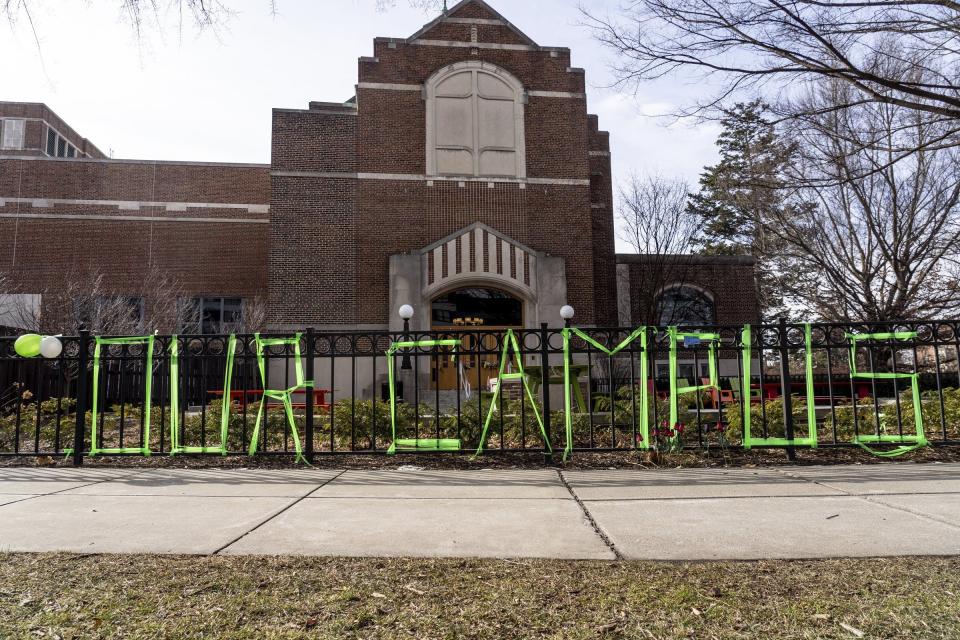
With 51,000 students and 13,000 faculty members − thousands of whom are new to campus this year − providing enough in-person sessions is logistically improbable.
Lynch suggested those who are trained have the responsibility to use what was learned during a crisis.
“We then request that those that have received the training help during critical incidents for those that may not be aware, or just under the circumstance, are unable to, because they’re … sort of in a shock with that. And so that community accountability comes in to help during the critical incident," Lynch said during the council meeting.
Even though de Simone is an art teacher, she knows her students would turn to her if another shooter shows up. She believes she and her colleagues should be required to know what to do.
“Some of this is just maybe the way I seek to protect my students. … I know these things are awful to think about, but it’s the world we live in today," de Simone said in a recent phone interview.
Whyte said Lynch and other leaders collaborated on the final call to not mandate training. They arrived at this decision after townhalls with the MSU community, trauma-informed experts and others; she did not provide a list of those consulted.
Students at the University of Virginia, where a gunman killed three people and injured two others last November, were required to undergo active violent intruder training before the start of the academic year, said a school spokeswoman. A Virginia Executive Order already required staff to undergo emergency training, she said.
A spokesman for Northern Illinois University, where a gunman killed five people and injured 17 others in 2008, said training is offered but not required. At Virginia Tech University, site of a 2007 shooting where 32 people died and 17 others were injured, a school spokesman confirmed all faculty and staff are required to annually undergo training.
The new lock on de Simone’s door makes her feel safer, she said.
There is a more robust campus alert system, used to warn about anything from a violent event to extreme weather. And signs posted around campus state “YOU NEED YOUR ID,” indicating people must have their university identification cards to access “most buildings.”
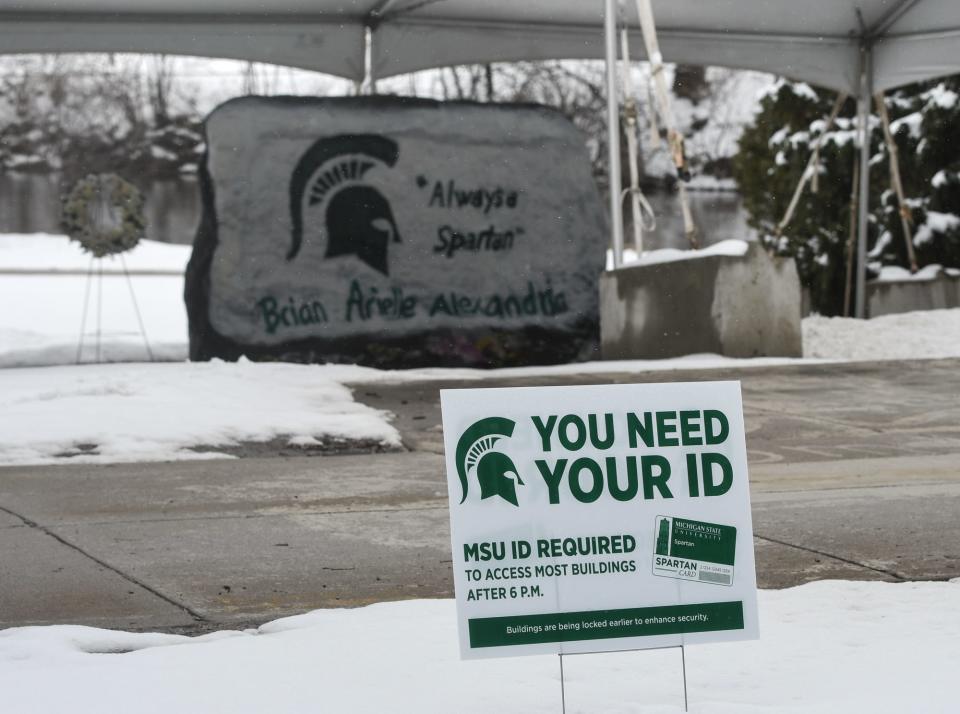
The university also recently banned anyone carrying a concealed firearm on campus, and installed metal detectors at the football stadium and basketball arena.
Emily Hoyumpa, a third year student and president of student government, said she also noticed signs of some of the changes on campus this fall. After living through last year’s shooting, the 20-year-old Shelby Township native notices all sorts of things she never thought she’d need to know.
Students are in various stages of grief, and some might struggle with active shooter training, she said. But she wants to take it, and is surprised the new training is unavailable.
“I’m glad to see there is work that has been done. However, there is still a lot of room to grow,” Hoyumpa said during a recent interview.
“There is improvement. However, we want more, and we expect more from this university.
MSU outlines changes after shooting
On March 1, Woodruff and other leaders sent a note to the campus community. It outlined several promises for improvements. Those included:
Requiring identification cards to access buildings after hours;
Adding more security cameras and implementing technology to centralize the monitoring of these cameras;
Installing new door locks;
Requiring active violent intruder training.
All of those are directly related to concerns the MSU community shared after the shooting.
Students and professors reported many classroom doors either locked only from the outside or could not lock, forcing people to rely on belts or other devices to keep them closed.
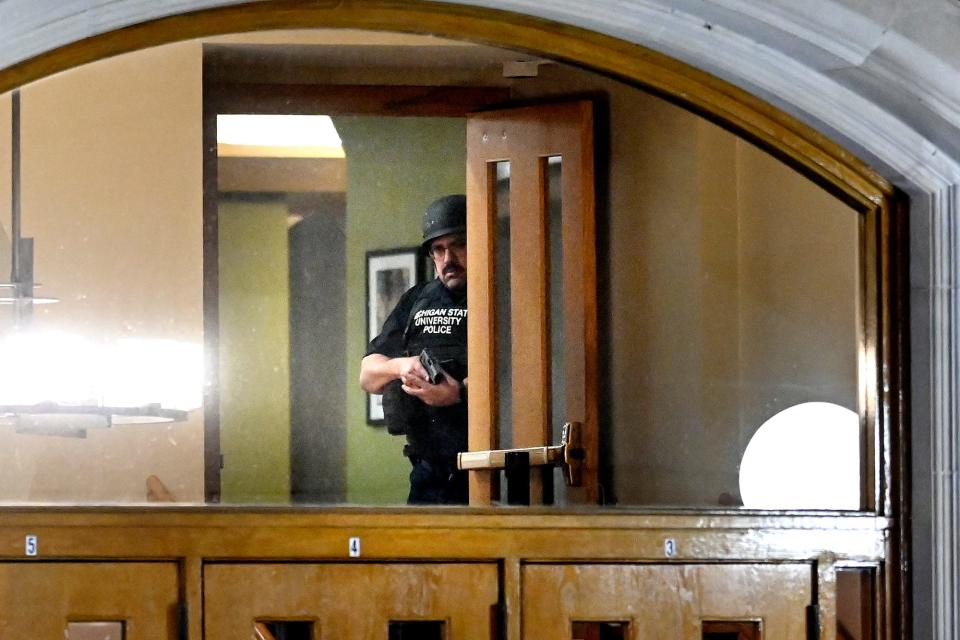
MSU police acknowledged they could not monitor all security cameras in real time, leading to confusion and widespread fear that ultimately allowed the shooter to leave campus without confronting law enforcement. The shooter managed to enter several buildings in the evening, despite having no connection to MSU. And many in the MSU community did not receive training on what to do if an active shooter comes on to campus.
As of now, the school did not achieve some of the goals and substantially altered others, as indicated in communications shared with the MSU community in late August.
The March note stated the university had "more than 1,300 academic classrooms" potentially in need of new locks by the start of the fall semester. The school already had a vendor who could install easily usable locks.
However, Olsen said recently that number was "inaccurate." Instead, hundreds of those are not traditional classes, but rather individual practice spaces, rehearsal locations or otherwise nontraditional rooms.
“Upon closer review by our Infrastructure, Planning and Facilities team, we were able to determine the number of classrooms that needed updated locking devices was 793. These are classrooms with direct access to and from public corridors, lobbies, etc.,” Olsen said in an email.
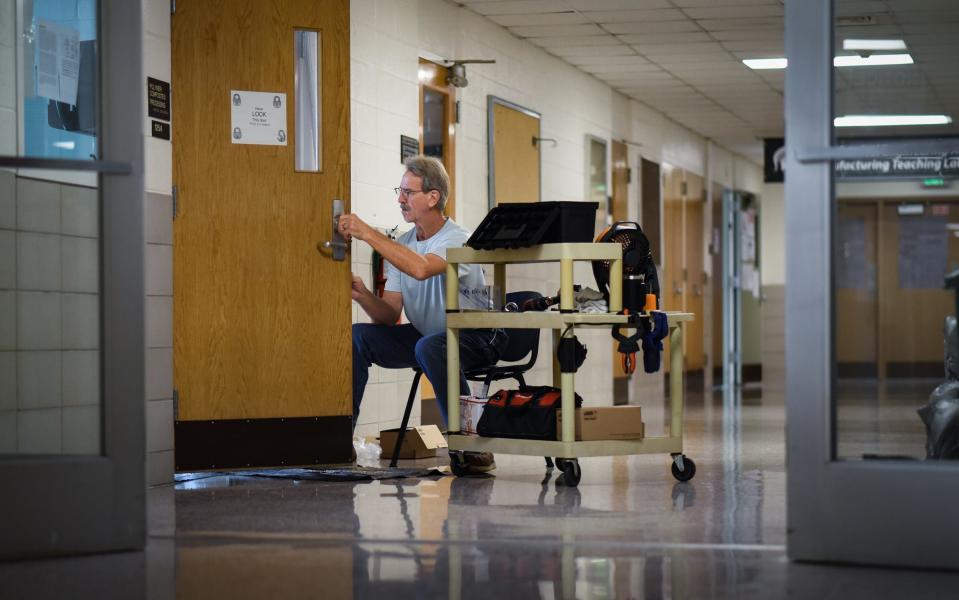
So far, MSU added new locks on 624 of these doors. Olsen said 29 doors in Berkey Hall – a shooting location that remains closed – will receive new locks before the end of the year.
New locks should be installed on the remaining 140 classrooms before the start of next academic year, Olsen said, adding it’s difficult to install locks while rooms are in use.
The real-time video and alarm monitoring is still a work in progress, Lynch said. The university plans to move into a new facility that allows for around-the-clock monitoring. But the department continues to use a temporary facility.
“The completion of the actual center should be the end of the calendar year,” he said.
The system that can simultaneously lock exterior building doors will be ready, “as quickly as possible,” Lynch said. He said MSU should have that capacity once a new access control platform is fully in use, but the integration of this system takes time.
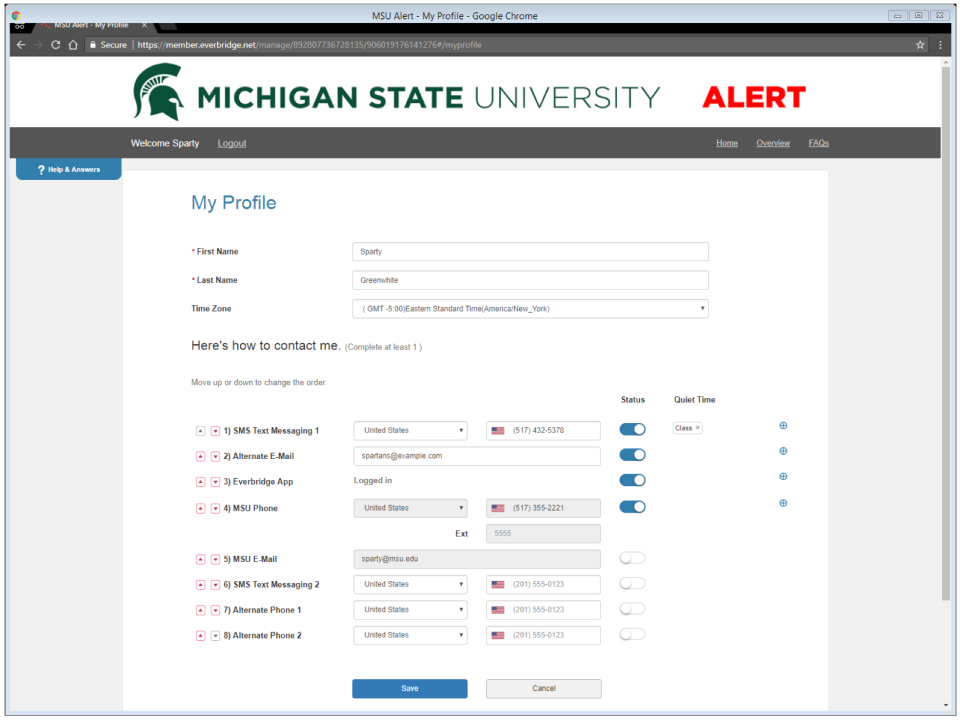
That's not good enough, argued Security Risk Management Consultants, the Ohio-based company that reviewed MSU's response to the shooting.
While the consultants determined that MSU police's immediate response to the shooting was "appropriate, timely, and correct," more needs to happen now to help limit the chances of another tragedy.
"The upgrade process ... will not happen overnight but there still needs to be a campus emergency lockdown feature," its final report states.
MSU agreed to pay $194,000 for the consultant's work, according to records obtained through the Freedom of Information Act. While the report notes MSU decided to reverse course on mandating training, there is no mention of the school later deciding hundreds of rooms still used by students and faculty no longer needed new locks.
Response to changes
Hoyumpa does not dwell on the shooting. But it resurfaces, despite her best efforts.
While studying abroad, a loud boom brought back evocative thoughts for Hoyumpa and some MSU classmates who were with her. Discussing something upsetting recently, a friend told her she hadn’t been that sad since the shooting.
Anything can be a reminder.
“You don’t think you’re going to spend four hours listening to a police scanner. Or trying to make sure your brother’s OK as he tells you ‘Emily, I’m gonna barricade my door. Emily, I see police sirens. Emily, I’m scared,’” Hoyumpa said, recalling conversations with a younger brother who also attends MSU and was on campus during the shooting.
“You don’t think that’s ever gonna happen to you. … Unfortunately, a lot of us have really vivid memories of that night, because of how much it has impacted us.”
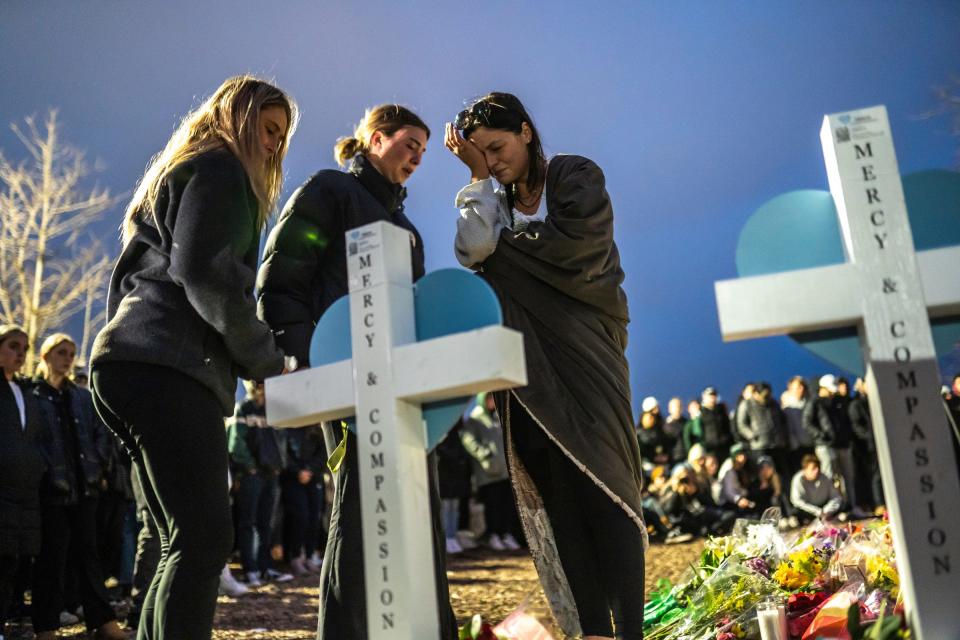
That sense of safety she and other young students took for granted is gone. Now, she’s checking door locks, thinking about emergency communications and otherwise engaging in situational awareness that may have seemed impossible for college students of a different time.
She’s not alone.
“A lot of feedback I’ve gotten is just, we need to do better and we’re hoping to see better,” she said.
“People have knowledge that changes have been made, such as the safe MSU app, getting those testing alerts, or seeing those door locks, or seeing the different ID changes. Yes, we’re happy progress is being made. However, as students and as Spartans and as someone who has had to live through a mass shooting, we expect more.”
Art professor de Simone agrees. She wishes there was at least a formal opt-out option for those who don’t feel quite ready for the intruder training.
But she fully understands the potentially dire consequences of not receiving training.
After the university meeting where Lynch discussed community safety, she said she asked students about violent intruder training. Specifically, about the part where Lynch suggested even if a professor did not receive training, but a student had, he would expect that young person to step up.
The same students who ask if they used the right color on their art projects, she noted.
“I said, ‘Honestly, I can’t imagine one of you having to take the lead.’ And they said, ‘No, we would look at you.’ Because, they look to me for everything,” she said.
“I see that as my role, and I think most faculty do.”
Reach Dave Boucher at dboucher@freepress.com and on X, previously called Twitter, @Dave_Boucher1.
This article originally appeared on Detroit Free Press: MSU changes course on safety goals, won't require active shooter training

